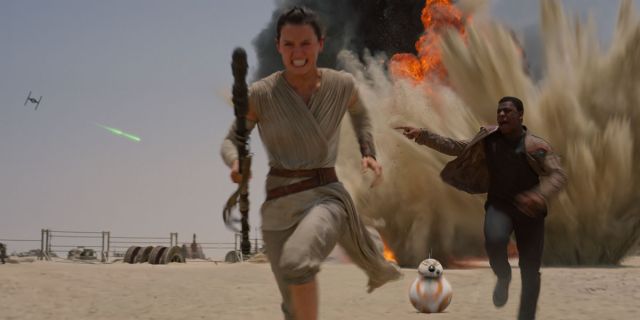The Force Awakens Gives Us a Strong, Capable & Competent Female Character in Rey
And that's a problem... how?

When I signed on the Internet last night and saw the term “Mary Sue” was a trending topic on Twitter, I ventured in cautiously. (After all, there could be any number of reasons why something is trending.) And it didn’t take me long to find this excellently written piece (warning: spoilers for the film within) by The Verge‘s Tasha Robinson on the character of Rey in The Force Awakens. There have been some who have suggested that because Rey is a strong and skilled female character, she’s a representation of a Mary Sue.
I won’t go into the definition of the term “Mary Sue” or why it actually has its own importance in the conversation; TMS‘ own Sam Maggs did a perfect job of delving into that already. The irony of it all is that the origins of the Mary Sue revolved around a satirical, self-insert fic; now, the term is typically used pejoratively, to most often describe a female character who is the fictional embodiment of wish fulfillment. We’ve embraced the term here, obviously; there’s even a post dedicated to the reasons why.
At this point, “Mary Sue” has gone through so many iterations–as a parody, as a tongue-in-cheek acknowledgment, as a method of trying to diminish a female character–that it seems difficult to really pin down one true meaning anymore. In the case of The Force Awakens‘ Rey, however, there’s no question that its current usage on the Internet is intended as a way of trivializing the importance of her character–not just to this film but to the Star Wars franchise as a whole.
In studying the preceding Star Wars films, an interesting point emerges. If Rey is a Mary Sue, she’s far from being the very first one. She just happens to be a girl, and for some that’s apparently a problem. Was there the same amount of agonizing over a young slave from Tatooine who was equally proficient in constructing a protocol droid from spare parts as well as building and flying his own podracer–all at the mere age of nine? Or when his offspring, who possessed little to no X-wing flight training, managed to take down a moon-sized space station with one shot guided by his use of the Force?
I’ve seen several people bring up the point that by their very nature, Jedi and Force-sensitive individuals are Mary Sues. The Force is everywhere and flowing through everything–it stands to reason that those who know how to use it would have more of an advantage over those who can’t. Is Luke too over-powered? Is Anakin? The conversation seems to take a very different tone when the topic turns to Rey. Next to two characters who singlehandedly took down an entire power from their tiny fighters (Luke with the Death Star, and Anakin with the Trade Federation), doesn’t it make sense that Rey would be able to pull off a few evasive maneuvers in an old ship? (I won’t go into serious detail because spoilers, but her handling of the Millennium Falcon is far from perfect.)
My feelings on the Mary Sue debate are very much in line with Robinson’s–when it comes to Rey, we shouldn’t be afraid to accept her, to embrace her. We should expect that The Force Awakens is only the beginning of her journey as a character and that there will hopefully be more opportunities within the later story for her to learn, to grow, to fail and to get back up again. It’s certainly important for us to look at TFA critically, to understand what makes it work as a movie and to recognize what still needs work. If we’re calling Rey a Mary Sue, there’s nothing wrong with that–as long as we’re also willing to call Luke Skywalker one too.
—Please make note of The Mary Sue’s general comment policy.—
Do you follow The Mary Sue on Twitter, Facebook, Tumblr, Pinterest, & Google +?
Have a tip we should know? [email protected]
